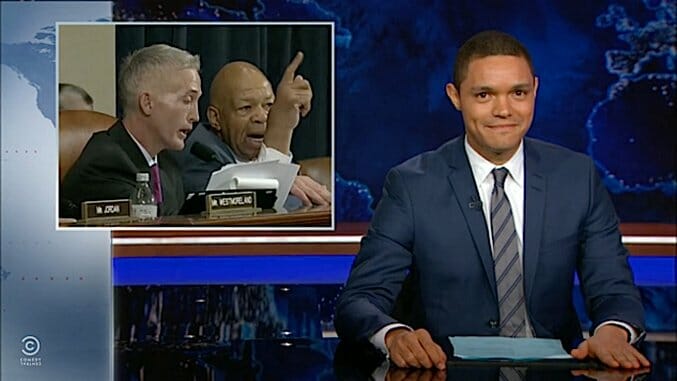The Death of Credible TV News Has Failed American Voters and Sabotaged Democracy

In the wake of Walter Cronkite’s death in 2009, Time ran a poll that declared satirical news anchor Jon Stewart the most trusted newscaster in America. Stewart prevailed over Katie Couric, Charles Gibson, and Brian Williams—names that are long gone from the evening news lexicon but whose names, at the time, hinted at journalistic gravitas.
If Time were to run a poll today asking its readers to choose between Scott Pelley, David Muir, Lester Holt, and Trevor Noah for the title of most trusted newscaster, people would be perplexed—not because a satirical news anchor was tossed in, but because the evening news broadcasts are no longer populated with household names. Despite the popularity of their predecessors, television ratings show that less than 25-percent of the audience of the major evening programs is between ages 25 and 54, meaning that the rest of the audience is, well, pretty old. And like its aging audience, television news has become progressively trivial to our political future.
Which, of course, isn’t surprising. The Internet has become an important news source: According to a recent survey conducted by the Pew Research Center, 50-percent of 18 to 29-year-olds “often” get their news from the Internet, while more non-millennials are turning to the Internet for news. Despite the pieces of investigative journalism on the Internet that has rivaled, and has sometimes surpassed, the quality of television reporting, a part of me feels that the Internet, in all its encyclopedic glory, has become more of an enforcer rather than a panacea to political apathy.
I was in high school in 2007 when FOX News was at war with the liberal media, Jon Stewart and Stephen Colbert elevated political satire to unforeseen heights, Saturday Night Live had one of its best casts and writing staff of all-time, and Rosie O’Donnell and Elisabeth Hasselbeck regularly debated Bush-era politics on The View. That sense of thoughtful chaos drew me into politics, as I witnessed how television boldly addressed the increasing chasm between liberal and conservative America with passionate discourse. Whether you agreed with Bill O’Reilly or Rachel Maddow, there was a sense that politics, as seen on television, captured a collective pulse. Public dialogue evolved into a spirited debate, and people tuned in to write about it, read about it, and talk about it. For once, television news strived to be the antithesis to Network’s proclamations about television news. Because television news didn’t want to be an illusion anymore—it wanted to be a reflection of our own burning paranoias and ideologies.
Politics on television reached its apex in 2008. Barack Obama and Hillary Clinton vied for the Democratic nomination. John McCain had selected an inexperienced Sarah Palin as his vice presidential candidate. Television’s political stratosphere reacted in a powerful way. Conservative media accused Obama of being born in Kenya to being secretly Muslim to being—and in retrospect, the most impressive accusation of them all—the anti-Christ. Tina Fey introduced her uncanny Sarah Palin impression on SNL. The New York Times even posted CliffNotes for The View’s John McCain interview. Politics and popular culture intertwined in a way that felt culturally revolutionary; even if you weren’t engaged in politics, television made politics digestible, and, most importantly, entertaining.
The 2008 presidential election resulted in 131 million votes, America’s first black president, and the birth of a new kind of conservative movement. Political participation felt tantamount to the citizenry. I can’t help but think that the forces of political commentary within our cultural lexicon galvanized the masses to vote. That dialogue that shaped and defined liberal and conservative America perhaps angered people as much as it inspired people to participate in the political process.
Fast forward to 2016. Somewhere along the way, the cable news wars died down, Jon Stewart left The Daily Show, everyone we loved left SNL, Colbert left The Colbert Report, and The View has become a daytime wasteland. Of no fault of their own, Pelley, Muir, and Holt deliver our evening news with relative anonymity; and Noah, Stewart’s heir, is braving The Daily Show’s ratings plummet. Sure, we still have John Oliver and Samantha Bee, but they lack Stewart’s or Colbert’s clout.
-

-

-

-

-

-

-

-

-

-

-

-

-

-

-

-

-

-

-

-

-

-

-

-

-

-

-

-

-

-

-

-

-

-

-

-

-

-

-

-








































